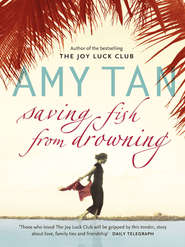По всем вопросам обращайтесь на: info@litportal.ru
(©) 2003-2024.
✖
The Opposite of Fate
Настройки чтения
Размер шрифта
Высота строк
Поля
“Now you believe,” she whispered in a grateful voice. Then she said what every good mother would say. “Okay, go get something eat now.”
“I can’t,” I answered. “There’s nothing to eat in the house. Lou used to go to the store to get food. But now he’s not here. And I can’t go out at night by myself. Someone might rob me.”
“But you hungry?”
“Well, only a little, but really, it’s okay. I won’t starve between now and morning. It’s all right if I’m just hungry.”
A good mother cannot bear to think her child’s stomach is empty.
“You scared, all alone?” she asked.
“A little,” I replied. “The house is so big now that I’m by myself. But I’ll check the doors often to make sure no burglars can get in. Good thing I’ll be moving to a smaller place.”
“Moving? Why?”
“You know, with the divorce, Lou will get half of everything. We’ll have to sell the house and cut up the money. And if I marry someone else and divorce that man, he’ll get half of that half, so then I’ll be left with one-quarter of what I have now. That’s how it is when you divorce your husband.”
My mother began to recall Lou’s better qualities. He bought me groceries, he drove me around, he was strong. She advised me to forgive him. Of course, I should punish him for a short time, tonight, but then tomorrow I should take him back.
“What good advice,” I told her. “Only you know how to save my marriage and my house so I won’t be poor.”
What had started as subterfuge on my part grew into an epiphany. I began to see how much I actually knew about my mother and myself. She was losing her mind, yes, but I was losing the defenses built up and fortified from childhood. The scars were dissolving and our hearts were becoming transparent. How could I have been so stupid not to know this all these years. It had been so simple to make my mother happy. All I had to do was say I appreciated her as my mother.
I now knew the answers to my mother’s impossible questions. “When you coming home?” was a common one because I was often away on book tours. If I gave her an actual date, she would ask five minutes later, “When you coming home?”
“We’re almost home,” I would say over the phone, no matter how long Lou and I would be gone. “Because we’ve missed you so much. We love you so much we can’t wait to come home and see you. You are the most important person to us in the whole world.” And she would stop asking. That was all she needed to know.
I found similar ways to help her remember. I used to tell her not to eat her regular dinner at five-thirty p.m. on days we would be taking her out to a restaurant. But she would inevitably forget and, when we showed up, act surprised and annoyed. “Dinner? You don’t tell me you take me to dinner.” The next time we wanted to take her out, I called and said in an excited voice: “Guess what! Tonight there’s a party at Fountain Court, your favorite. You know why? Because everyone who loves you will be there. You’re going to be the star! We’ll order all your favorite dishes—juicy prawns, and tender squid, and the fresh snow-pea greens with the little sweet sprouts you love so much. Wear your pink dress. You always look so pretty in that. You will be the prettiest girl in the entire restaurant.”
And sure enough, when we arrived to pick her up, she had remembered not to eat her regular meal and she had on her pink dress. Is happiness in dementia true happiness? Yes, it is. I know for certain now.
In the last week of my mother’s life, she began to talk to ghosts. “Nyah-nyah,” she moaned in Shanghainese, and waved to someone she saw above her. Then she motioned to me, indicating that I should invite this ghost to come in. She spoke gibberish in a shaky voice, yet it was understandable what she meant. I could still translate: “Sit, sit. Tea. Quick, quick. Coat, coat, best coat.” And I fetched the mink out of her closet and placed it where the ghost might have sat down.
My mother continued to chat excitedly to an invisible crowd of people. She grabbed my hand and pointed. “Yes, I see,” I said. “So many people.” At one point, I forgot about the pretense, and when a chilly fog wind blew through the open window, I took the mink coat that I had draped over the sofa and placed it over my mother’s legs. She grunted and protested with spitting sounds, then pointed to the bare spot on the sofa. Oh, right—how could I forget! Nyah-nyah was there, wearing the mink coat. I put the coat back on the sofa, marveling over the contradictions of my mother’s memory.
I finally thought to ask what Nyah-nyah meant.
“A Shanghainese nickname for ‘Grandmother,’” my oldest sister replied. And then I remembered a story my mother had once told me, of her being four years old, delirious and near death as she called to her grandmother to stop the pain. My mother had been horribly injured when a pot of boiling soup fell across her neck. Nyah-nyah had sat by her bedside, day and night, telling her that her funeral clothes had already been made but were very plain because she had not lived long enough to deserve anything more elaborate.
Вы ознакомились с фрагментом книги.
Приобретайте полный текст книги у нашего партнера:
Приобретайте полный текст книги у нашего партнера:










